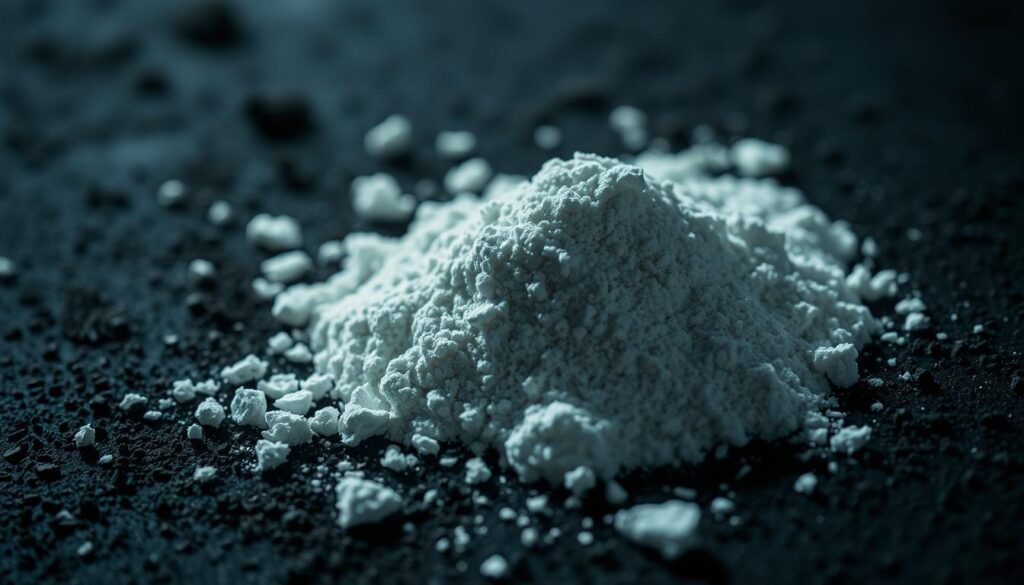Nelson Mandela once said, “The greatest glory in living lies not in never falling, but in rising every time we fall.” This quote is very fitting when we talk about heroin. It’s a very addictive opioid made from morphine. People often use it for the good feelings it gives, but it can cause serious harm.
The National Institute on Drug Abuse says heroin can lead to addiction, overdose, and health problems. It’s very important to know the dangers of heroin.
Introduction to Heroin
Heroin is a very strong opioid that can harm a lot of people. It’s important to know the dangers of heroin addiction. In this article, we will look into heroin, its risks, and how to get help for addiction.
Key Takeaways
- Heroin is a highly addictive opioid derived from morphine.
- Heroin use can lead to addiction, overdose, and long-term health problems.
- The National Institute on Drug Abuse reports on the risks associated with heroin use.
- Heroin addiction can have severe physical and psychological consequences.
- Understanding the risks of heroin is crucial to getting help and overcoming addiction.
- Heroin use can have devastating effects on individuals and communities.
Understanding Heroin and Its Basic Properties
Heroin is a semi-synthetic opioid made from natural substances but changed through chemicals. Knowing its properties, like chemical makeup and street names, helps us understand its dangers. This knowledge is key for those fighting heroin use in their communities.
Heroin’s chemical makeup is diacetylmorphine, a form of morphine from the opium poppy. It’s known by many street names, like “H”, “smack”, or “junk”. These names change based on where you are and the culture.
Chemical Composition of Heroin
Heroin’s diacetylmorphine structure makes it very potent and addictive. This structure is why heroin works fast and can lead to strong addiction and overdose risks.
Common Street Names and Forms
Heroin goes by many names, like “H”, “smack”, or “junk”. It comes in powder, tablets, or liquid and can be used in different ways. This variety makes it hard to spot and fight heroin use in communities.
Historical Background and Current Usage
Heroin has been around since the late 19th century. Today, it’s tightly controlled. Yet, heroin remains a big problem, causing harm to many people and communities.
How Heroin Affects the Human Body
Heroin is a highly addictive opioid that affects the human body in various ways. When heroin enters the body, it binds to opioid receptors in the brain, spinal cord, and other areas. This produces feelings of pain relief and euphoria. This can lead to physical dependence and addiction, as well as a range of other health problems.
Some of the immediate effects of heroin on the body include slowed breathing, constipation, and nausea. Long-term use can lead to more serious health issues, such as heart disease, kidney disease, and mental health disorders. It’s essential to understand the risks associated with heroin use and seek help if you or someone you know is struggling with addiction.
- Slowed breathing and heart rate
- Constipation and nausea
- Pain relief and euphoria
- Physical dependence and addiction
- Increased risk of heart disease, kidney disease, and mental health disorders
It’s crucial to address heroin addiction and seek professional help to overcome its effects on the human body. By understanding the risks and consequences of heroin use, we can work towards a healthier and more supportive community.
Short-term Effects of Heroin Use
Heroin is a highly addictive opioid that can have severe short-term effects on the body. When someone uses heroin, they may feel a range of immediate physical and psychological effects. These effects can be intense and potentially life-threatening.
Using heroin can make users feel euphoric and relaxed. This is because the drug interacts with the brain’s opioid receptors. But, this feeling is often mixed with negative physical effects like drowsiness, confusion, and impaired coordination. There’s also a big risk of overdose, as heroin can slow down or stop breathing, leading to brain damage or death.
The immediate physical effects of heroin use can be severe. Some common effects include:
- Drowsiness and sedation
- Confusion and disorientation
- Impaired coordination and balance
- Slowed or stopped breathing
The psychological impact of heroin use can also be significant. It can produce feelings ofrelaxationand reduced anxiety. But, the risks of heroin use are much greater than any temporary benefits. It’s crucial to seek help and support for those struggling with heroin addiction.
Long-term Consequences of Heroin Addiction
Heroin addiction can severely harm your body and mind. Using heroin regularly can damage your kidneys and liver. It also raises your risk of heart disease and stroke.
The effects of heroin addiction go beyond health. It can ruin your job, relationships, and even your home.
Some serious effects of heroin addiction include:
- Increased risk of mental health disorders, such as depression and anxiety
- Damage to the brain’s reward system, leading to long-term changes in behavior and mood
- Increased risk of infectious diseases, such as HIV and hepatitis
Getting help is key to beating heroin addiction. With the right treatment, you can live a healthy, happy life.
Recovering from heroin addiction needs a full plan. This includes medicine, counseling, and support groups. With help, you can overcome addiction and find lasting recovery.
How Long Does Heroin Stay in Your System?
When we talk about heroin in your system, it’s key to know what affects its detection. How long heroin stays in your system can change a lot. This depends on your metabolism, how much you take, and how often you use it.
Heroin can be found in your system for a few hours to several days. It can show up in urine for up to 2 days, in blood for up to 12 hours, and in hair for up to 90 days. Knowing these times is very important if you might have to take a drug test.
Detection Windows in Different Drug Tests
- Urine tests: 2 days
- Blood tests: 12 hours
- Hair tests: 90 days
Also, heroin in your system can be influenced by your body and health. The type of drug test also plays a role in how long it can be detected.
Factors Affecting Detection Time
Several things can change how long heroin stays in your system. These include:
- Metabolism: How fast your body processes heroin can affect how long it stays in you.
- Dosage: The amount of heroin you take can change how long it’s detectable.
- Frequency of use: Using heroin regularly can make it stay in your body longer.
Knowing these factors is very important for those fighting heroin addiction. It helps them understand the challenges they face.
Signs Someone Is Using Heroin

Heroin use can be spotted through different signs and symptoms. People addicted to heroin may show physical and behavioral changes. Physical signs include needle marks, track marks, or scarring on the skin. They might also have slowed breathing, constipation, and nausea.
Behavioral changes are also common. These can be increased secrecy, mood swings, and losing interest in activities. If you think someone is using heroin, it’s important to be understanding and empathetic. Recognizing these signs can help you support them and encourage them to get help.
Some common signs of heroin use include:
- Needle marks or track marks on the skin
- Changes in behavior, such as increased secrecy or mood swings
- Slowed breathing or other physical symptoms
- Loss of interest in activities or hobbies
Heroin addiction is a serious issue that needs professional help and support. If you or someone you know is struggling with heroin addiction, it’s crucial to seek help from a qualified healthcare professional or a reputable treatment center.
The Path to Heroin Addiction
Heroin addiction starts with misuse of prescription opioids. People might get these for pain but then get hooked on the high. When these opioids are hard to get or too pricey, they might switch to heroin for its cheaper, easier access.
As they use more to feel the same, they become physically dependent and addicted. Several factors increase the risk of heroin addiction, including:
- Genetic predisposition
- Environmental factors, such as exposure to substance abuse at a young age
- Mental health issues, such as depression or anxiety
Knowing these risk factors helps prevent heroin addiction. Recognizing addiction signs and getting help early can help people beat heroin dependence. This leads to a healthier, more balanced life.
The link to prescription opioids is a big worry. It shows we need careful prescribing and safe disposal of unused meds. By tackling these issues and offering good treatment, we can lower heroin addiction rates. This makes our community safer and healthier.
Treatment Options for Heroin Addiction

Heroin addiction is a complex issue that needs a comprehensive treatment approach. Treatment usually includes medication, counseling, and support groups. Medications like methadone, buprenorphine, and naltrexone help manage withdrawal symptoms and reduce cravings.
Some treatment options for heroin addiction include:
- Inpatient treatment programs, which provide a structured and supportive environment for recovery
- Outpatient treatment programs, which offer flexibility and convenience for individuals with work or family commitments
- Counseling and therapy, which can help individuals address underlying issues and develop coping strategies
- Support groups, which provide a sense of community and accountability for individuals in recovery
Recovery from heroin addiction is a long-term process. It requires commitment, patience, and support. With the right treatment and a strong support system, individuals can overcome their addiction.
Supporting a Loved One with Heroin Addiction
When a loved one battles heroin addiction, it’s tough to know how to help. It’s key to be empathetic and understanding, not judgmental. This way, you create a safe space for them to share their struggles.
Here are some ways to support a loved one with heroin addiction:
- Encourage them to seek professional help, like counseling or rehab.
- Be there to listen and offer emotional support.
- Help them stay on track with their recovery goals.
It’s also vital for family members to take care of themselves. This can mean getting counseling or joining support groups. It helps deal with the emotional impact of heroin addiction.
By being supportive and non-judgmental, you can help your loved one beat heroin addiction. Together, you can work towards a healthier, happier life.
Recovery Resources and Support Networks
Recovering from heroin addiction needs a full plan that includes medicine, counseling, and support. People fighting heroin addiction can get help from many places. These resources aim to give a feeling of community and help keep you on track, which are key for recovery.
Important resources for heroin addiction recovery include support groups and online forums. These offer advice, support, and a connection with others facing similar challenges. Local treatment centers and healthcare providers also offer medication and counseling, vital for recovery.
Remember, beating heroin addiction is a long journey that takes time, effort, and dedication. With the right help and support, people can beat their addiction and live a better life. The benefits of these resources include:
- Access to medication and counseling
- Support from others who are going through similar experiences
- Guidance and accountability throughout the recovery process
- Opportunities for personal growth and development
If you’re fighting heroin addiction, know that help is out there. By reaching out to these resources and support networks, you can start your journey to recovery and a brighter future.
Conclusion: Taking the First Step Toward Recovery
Overcoming heroin addiction is tough but possible. The first step is to admit you need help. If you or someone you care about is fighting heroin addiction, know you’re not alone. There are caring resources and support groups ready to help.
Recovery is different for everyone. You might need a rehab program, support groups, or a therapist. Whatever you choose, remember you’re not alone. There’s hope for a better future ahead.
With determination and the right support, you can overcome heroin addiction. Take that first brave step today. Let the healing start. Your recovery journey begins now.
FAQ
What is heroin?
Heroin is a highly addictive opioid made from morphine. It’s found in the opium poppy plant. People use it for its euphoric effects but it can cause severe physical and psychological harm.
What are the common street names and forms of heroin?
Heroin is known as “H”, “smack”, or “junk” on the streets. It comes in white or brown powder, black sticky substance (“black tar heroin”), or pill form.
How does heroin affect the human body?
Heroin binds to opioid receptors in the brain and spinal cord. It gives feelings of pain relief and euphoria. But, it can slow breathing, cause constipation, and nausea. Long-term use can lead to addiction and health problems.
What are the short-term effects of heroin use?
Heroin use can make you drowsy, confused, and uncoordinated. It can also make you feel euphoric and relaxed. But, it increases the risk of overdose, which can be fatal.
What are the long-term consequences of heroin addiction?
Chronic heroin use can cause kidney and liver disease. It also increases heart disease and stroke risk. Addiction can lead to job loss, relationship breakdown, and mental health issues like depression and anxiety.
How long does heroin stay in your system?
Heroin can be detected in urine, blood, and hair tests. The detection window varies by test and individual factors. Generally, it’s detectable in urine for up to 2 days, in blood for up to 12 hours, and in hair for up to 90 days.
What are the signs that someone is using heroin?
Signs include needle marks, track marks, or scarring. Changes in behavior, like increased secrecy and mood swings, are also signs. Physical signs include slowed breathing, constipation, and nausea.
How does someone become addicted to heroin?
Addiction often starts with prescription opioid misuse. As these become harder to get, people turn to heroin. They need more to feel the same effects, leading to addiction.
What are the treatment options for heroin addiction?
Treatment includes medication, counseling, and support groups. Medications like methadone help manage withdrawal. Counseling and therapy address underlying issues. Support groups provide community and accountability.
How can I support a loved one with heroin addiction?
Supporting someone with addiction is challenging. Be empathetic and understanding, not judgmental. Use communication strategies like active listening. Set boundaries and take care of yourself to cope with the emotional toll.
What recovery resources and support networks are available?
Recovery needs a comprehensive approach with medication, counseling, and support. Support networks like 12-step programs offer community and accountability. Online resources and local treatment centers provide guidance and access to help.


